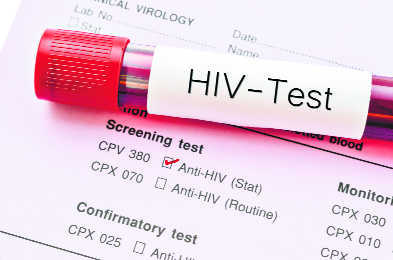Bengaluru, Apr 1: Researchers at the Indian Institute of Science (IISc) here have developed artificial enzymes that they said can successfully block reactivation and replication of the Human Immunodeficiency Virus (HIV) in the host's immune cells.
Made from vanadium pentoxide nanosheets, these "nanozymes" work by mimicking a natural enzyme called glutathione peroxidase that helps reduce oxidative stress levels in the host's cells, which is required to keep the virus in check, an IISc statement said on Thursday.
The study, published in 'EMBO Molecular Medicine, was led by Amit Singh, Associate Professor and Wellcome Trust-DBT India Alliance Senior Fellow at the Department of Microbiology & Cell Biology and Centre for Infectious Diseases Research (CIDR), and Govindasamy Mugesh, Professor at the Department of Inorganic and Physical Chemistry.
"The advantage is that the nanozymes are stable inside biological systems and do not mediate any unwanted reactions inside the cells," Mugesh said. "They are also quite easy to prepare in the lab."
There is currently no way to eliminate HIV from a patient's body completely, according to the statement.
Anti-HIV drugs are only successful in suppressing the virus; they fail at eradicating HIV from infected cells. The virus hides inside the hosts immune cells in a "latent" state and stably maintains its reservoir.
When the levels of toxic molecules such as hydrogen peroxide increase in the host's cells, leading to a state of increased oxidative stress, the virus gets "reactivated" - it emerges from hiding and begins replicating again, it said.
A few years ago, Amit Singh's team developed a biosensor to measure oxidative stress levels in HIV-infected immune cells in real-time, it was stated.
"We found that to come out of latency and reactivate, HIV needs very little oxidative stress," he said.
One way to prevent reactivation is to keep the oxidative stress constantly low, which would "lock" the virus in a permanent state of latency.
Enzymes such as glutathione peroxidase are essential for this process; they convert toxic hydrogen peroxide to water and oxygen. However, inducing the host cells to produce more quantities of these enzymes could disrupt the tightly regulated cellular redox machinery.
Around the same time, Mugesh's group published a study showing that nanowires made of vanadium pentoxide can efficiently mimic the activity of glutathione peroxidase.
Singh's lab, therefore, decided to collaborate with them.
The researchers prepared ultrathin nanosheets of vanadium pentoxide in the lab and treated HIV-infected cells with them.
The sheets were found to reduce hydrogen peroxide just as effectively as the natural enzyme and prevent the virus from reactivating.
"We found that these nanosheets were having some sort of direct effect where the expression of the host genes essential for virus reactivation is reduced," said Shalini Singh, first author and Research Associate at CIDR.
When the team treated immune cells from HIV-infected patients undergoing antiretroviral therapy (ART) with the nanozymes,latency was induced faster and subsequent reactivation was suppressed when therapy was stopped, indicating that combining the two was more effective, she added.
Combining ART with the nanozymes also has other advantages.
Some ART drugs can cause oxidative stress as a side effect, which can damage heart or kidney cells, Amit Singh said.
"Adding a nanozyme like this can help in reducing the side effects caused by such ART drugs." This can improve the quality of life of HIV patients undergoing treatment.
Although the nanozymes were found to be harmless to normal cells in lab tests, Mugesh said further studies are needed to understand if they can have other effects once they are introduced inside the body.
"Where will they go? Which organs will they enter? How long will they stay in the body? We need to look at all these aspects," he added.
Let the Truth be known. If you read VB and like VB, please be a VB Supporter and Help us deliver the Truth to one and all.
Mumbai (PTI): Maharashtra Chief Minister Devendra Fadnavis on Wednesday described Deputy CM Ajit Pawar’s tragic death in a plane crash as unbelievable, and said he had lost a good friend.
Fadnavis said “today” (January 28) will be a government holiday and there will be a three-day state mourning as a mark of respect to Pawar.
Ajit Pawar’s death has left a void that will never be filled, he said. “After working closely together, it is unbelievable that he is no more,” Fadnavis said.
Talking to reporters, Fadnavis described Pawar as a people’s leader who knew the state well and had a deep understanding of the issues in Maharashtra. He said it takes several years to build and establish such leadership.
Fadnavis said he had apprised Prime Minister Narendra Modi and Union Home Minister Amit Shah about the tragedy. The CM said he had also spoken with Ajit Pawar’s cousin Supriya Sule and his son Parth Pawar.
“Both (Deputy CM) Eknath Shinde and I are leaving for Baramati now. Once their entire family gathers in Baramati, we will share further details,” he said.
The entire state stands by Pawar’s family and his party NCP in this hour of grief, he added.
Ajit Pawar, 66, and four other persons were killed after an aircraft carrying them crashed in Maharashtra’s Pune district on Wednesday morning, officials said. The incident occurred when the plane carrying Pawar and others landed near Baramati, they said.
Several state BJP leaders, including Ashish Shelar, Ravindra Chavan and Chandrashekhar Bawankule, expressed deep grief over Pawar’s passing.
“This heart-wrenching incident has left the mind numb. Maharashtra has lost an experienced, dutiful and resolute leader,” state minister Shelar said.
Pawar left a distinct imprint on the state’s politics through his strong grip over administration, decisiveness and relentless drive for Maharashtra’s all-round progress. “Firmness, discipline, punctuality and tireless dedication were defining aspects of his personality,” he said.
BJP state president Ravindra Chavan said Maharashtra’s politics was unimaginable without Pawar. He said Pawar was known as a dynamic leader with a powerful command over administration and an unwavering focus on the state’s comprehensive development.
He said Pawar held the record for serving the longest tenure as deputy CM in the state’s history and left an indelible mark while handling key portfolios such as irrigation, energy and finance. “With his passing, Maharashtra has lost a firm, disciplined, punctual and indefatigable leader. This void can never be filled,” Chavan said.
Revenue Minister Chandrashekhar Bawankule described Pawar as a senior friend and guide. “Even now, it is difficult to accept that this tragedy has really happened,” he said. Pawar would be remembered as a true people’s leader who gave clear direction and unstoppable momentum to Maharashtra’s all-round development, Bawankule said.
Recalling Pawar’s immense administrative experience, Bawankule said he had personally sought the NCP leader’s advice on several occasions.
“The loss of Ajitdada is not merely the departure of one leader; it is a profound loss for Maharashtra itself. The nation has lost a visionary statesman, and I have lost a dear elder friend and guide,” Bawankule said, adding that the reality of Pawar no longer being among them felt impossible to accept.
VIDEO | Maharashtra CM Devendra Fadnavis expresses grief over the demise of Deputy CM Ajit Pawar in an aircraft crash. He says, “This morning, a very tragic incident occurred. In extremely unforeseen circumstances, the news of the unfortunate demise of our state’s deputy chief… pic.twitter.com/sKIKJ5FvRW
— Press Trust of India (@PTI_News) January 28, 2026





